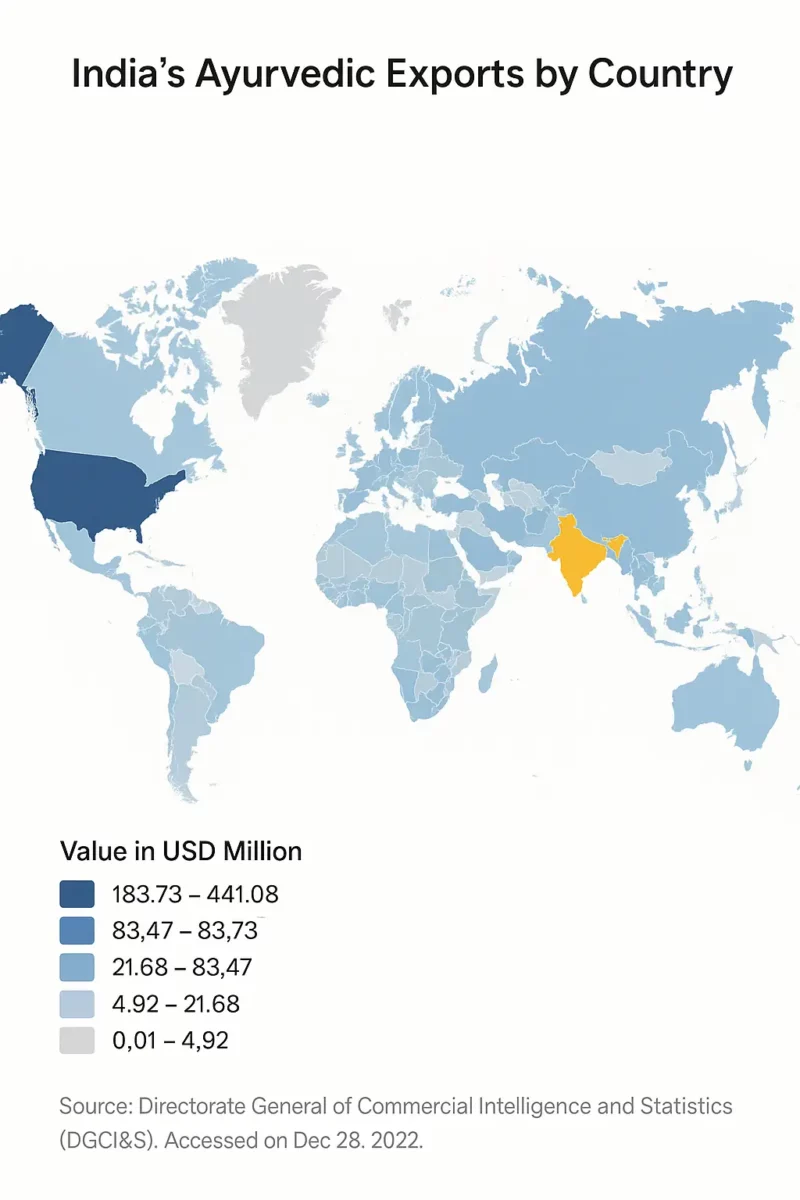So, you’re thinking about taking your Ayurvedic business global? Great choice!
Ayurvedic and herbal products export from India are in high demand worldwide, and now is the perfect time to tap into this growing market.
But before you jump in, there are a few things you must know. Let’s walk through the entire process step by step.
Why the World Loves Ayurveda
Ayurveda has been around for thousands of years, but it’s only recently that people across the globe have started embracing it in a big way. Whether it’s herbal skincare, immunity boosters, or wellness supplements, the demand is skyrocketing. Countries like the US, UK, Germany, Australia, and Canada are loving these products. Selling ayurvedic products in the US has especially gained momentum, with consumers seeking natural, holistic alternatives. If you’re exploring ayurvedic products export from India, you’re tapping into a thriving global trend. So, if you’re thinking about exporting, you’re already on the right track!
If you’re exploring export of Ayurvedic products from India, you’re tapping into a thriving global trend. So, if you’re thinking about exporting, you’re already on the right track!
Getting the Right Licenses for Ayurvedic Exports
Before you can start shipping your products worldwide, you’ll need to get some essential licenses. Here’s what you’ll need:
- Manufacturing License: This is issued by the AYUSH Ministry under the Drugs and Cosmetics Act, 1940.
- Export Registration: Register with the Directorate General of Foreign Trade (DGFT) and get your Importer Exporter Code (IEC).
- Good Manufacturing Practice (GMP) Certification: Proves your products meet high-quality standards.
- Certificate of Free Sale: Shows that your product is legally sold in India and is safe for international markets (in case of exporting Ayurvedic supplements and medicines).
- FSSAI License: Required to export consumables.
- FDA Approval: If you’re planning to export to the US, this is a must. Make sure to meet FDA registration and product labelling requirements.
- NPOP (National Program for Organic Production) Certification: Required to export organic products.
- Based on the Ayurvedic product being exported, like in case of Ayurvedic medicines, other certificates will also be required:
i) Inspection certificate- Ensures safety from contamination by heavy metals or pesticides.
ii) Safety and quality certificate- This is issued via independent review and submitted by the producer.
Ayurvedic Product Certification – Why It Matters
If you want your products to be taken seriously (and legally sold!), certifications are key. Here are the ones that will boost your credibility:
- AYUSH Premium Mark – Confirms that your products meet international quality standards.
- WHO-GMP Certification – Ensures that your manufacturing practices meet World Health Organization standards.
- US FDA Certification – A must-have if you want to sell in the US market.
- EU Cosmetic Regulation Certification – Essential for selling herbal and cosmetic products in Europe.
- ISO Certification – Validates your product’s quality on a global scale.
Navigating FDA and EU Regulations
Different countries have different rules, and you need to make sure you comply with them. Here’s a quick breakdown of some of the important regulations that you must know and documents that you would need to start exporting to the US or EU.
For the US (FDA Regulations)
| Requirement | Details |
|---|---|
| Compliance with DSHEA | Your Ayurvedic supplements must comply with the Dietary Supplement Health and Education Act (DSHEA). |
| Ingredient Disclosure | Labels should include ingredient disclosure, health warnings, and dosage instructions. |
| Good Manufacturing Practices (GMP) | Follow Good Manufacturing Practices (GMP) to ensure quality. |
If you are planning how to export Ayurvedic products from India to USA, these are your non-negotiable steps for compliance.
For the European Union (EU Regulations)
| Requirement | Details |
|---|---|
| Oversight by EMA | The European Medicines Agency (EMA) oversees herbal medicines. |
| Compliance with THMPD | Products must comply with Traditional Herbal Medicinal Products Directive (THMPD). |
| Proper Labeling | Packaging must list ingredient percentages and safety warnings. |
| Contaminant Testing | Ensure your products are free from heavy metals, pesticides, and microbial contamination. |
Best Countries for Ayurvedic Exports
Wondering where to start? Here are some of the hottest markets for Ayurvedic products:
- United States – Huge demand for herbal wellness products.
- United Kingdom
- Germany
- United Arab Emirates – A lucrative market for Indian herbal remedies.
Reportedly, the USA (34.95%), EU (18.66%), and UAE (5.52%) are the key markets for the majority of Ayush exports. They made up 59.12% of all Ayush exports in 2021.
Figure: India’s Export of Ayush product to the World, 2021 (Source: Ayush Export Report, 2023)

Ayurveda Product Markets
The global demand for Ayurvedic products is growing steadily, fueled by increasing awareness of holistic health, plant based ingredients, and ancient wellness systems. Here’s a snapshot of how Ayurveda is being embraced in key international and domestic markets:
United States Ayurvedic Products Market
- Market Size and Growth: The US market for Ayurvedic products is expected to reach USD 1.5 billion by 2027, with a CAGR of over 15%.
- Key Segments: Herbal supplements, organic skincare, adaptogens like Ashwagandha, and digestive aids.
- Consumer Behavior: A growing number of health-conscious millennials and alternative medicine seekers are turning to Ayurveda for stress relief, sleep improvement, and immunity.
- Trends: Increasing popularity of Ayurveda in yoga communities, Ayurvedic spa treatments, and personalized wellness plans.
- Regulatory Tip: All products must comply with FDA regulations and labeling standards for dietary supplements.
United Kingdom Ayurvedic Products Market
- Market Sentiment: The UK has seen a surge in demand for natural and plant-based health solutions, with Ayurveda gaining popularity in urban centers like London, Manchester, and Birmingham.
- Top Sellers: Ayurvedic teas, herbal capsules, hair oils, and skincare products.
- Market Size: Estimated at USD 500+ million, with year-on-year growth of 10-12%.
- Distribution Channels: Health stores, online platforms like Amazon UK, and ethnic supermarkets.
- Trend Insight: Ayurveda is frequently promoted as part of mind-body wellness retreats and self-care routines, especially among women aged 25–45.
India Ayurvedic Products Market
- Domestic Demand: India’s Ayurvedic market was valued at INR 620 billion (~USD 7.5 billion) in 2023 and is projected to double by 2027.
- Consumer Shift: Increasing preference for Ayurvedic over allopathic medicine, especially post-COVID, for immunity, detox, and lifestyle diseases.
- Top Brands: Patanjali, Dabur, Himalaya, Baidyanath, Kama Ayurveda, Forest Essentials.
- Export Potential: India is the leading exporter of Ayurvedic raw materials and finished goods, particularly targeting the US, UAE, Germany, and Sri Lanka.
- Government Support: Schemes like AYUSH Export Promotion Council, Startup India, and PLI for AYUSH products are boosting production and export.
Germany Ayurvedic Products Market
- Market Characteristics: Germany has one of the strongest natural health product markets in Europe, with a clear preference for certified organic and plant-based remedies.
- Consumer Profile: Educated, middle-aged to elderly population seeking alternatives to chemical-based pharmaceuticals.
- Estimated Market Value: Around USD 300 million, growing at a steady pace with rising Ayurvedic awareness.
- Popular Products: Digestive herbs, massage oils, Ayurvedic shampoos, and therapeutic teas.
- Challenges: Strict EU regulatory frameworks and product documentation for importers.
- Opportunity: Collaborations with wellness clinics, natural pharmacies, and bio stores are helping Indian brands enter the market.
Top 3 Ayurvedic Products to Export from India
If you’re wondering how to export Ayurvedic products from India, start with these categories:
Essential Oils
Essential oils made from organic flowers and herbs are widely used in aromatherapy, skincare, and wellness routines. Some of the most sought-after Ayurvedic essential oils include:
- Rose Essential Oil
- Sandalwood Essential Oil
- Cinnamon Essential Oil
- Basil Essential Oil
- Orange Essential Oil
Ayurvedic Skincare Products
Natural beauty is a global trend, and Ayurvedic skincare products are at the forefront. Some of the most popular products include:
- Hair Masks
- Toners and Serums
- Face Masks
- Hair Oils
Health Supplements and Consumables
With people becoming more health-conscious, Ayurvedic health supplements and food products are gaining traction. Some of the most in-demand items include:
- Turmeric (Curcumin) Supplements
- Neem Extracts
- Chyawanprash
- Ashwagandha Supplements
- Herbal Teas
Ayurvedic Product Packaging and Labeling
Your product’s packaging can make or break your success in international markets. Here’s what to focus on:
Packaging Tips:
- Use eco-friendly, biodegradable materials – Consumers love sustainability!
- Make sure your packaging is airtight and moisture-resistant.
- Include multi-language labeling to cater to global customers.
Labeling Must-Haves:
- Product Name and Ingredients – Clearly list what’s inside.
- Usage Instructions – Help customers understand how to use your product.
- Manufacturing and Expiry Dates – Transparency is key!
- Health Warnings and Disclaimers – Avoid legal troubles by including necessary safety info.
- Barcode and Batch Number – Important for tracking and inventory.
Your Step-by-Step Guide to Exporting Ayurvedic Products from India
This is your ultimate blueprint for how to export Ayurvedic products from India successfully:
Step 1: Get Licensed
- Make sure you have all the necessary approvals and certifications before you start.
Step 2: Register as an Exporter
- Get an Importer Exporter Code (IEC) from DGFT.
- Sign up with export councils like Pharmexcil and FIEO.
Step 3: Choose Your Market and Do Your Research
- Find out where Ayurvedic products are in high demand.
- Understand the local regulations and consumer preferences.
Step 4: Product Testing and Compliance
- Conduct thorough testing to meet international standards.
- Obtain certifications like WHO-GMP and AYUSH Premium Mark.
Step 5: List Your Products and Connect with Buyers
- List your products on Amazon, eBay, and Alibaba.
- Expand your online presence while strengthening your offline or retail operations.
Step 6: Packaging and Labeling
- Make sure your packaging is compliant with international regulations.
Step 7: Shipping and Logistics
- Partner with reliable logistic service providers like ShipGlobal or DHL to export Ayurvedic products.
- Ensure all required export documentation is in place (Bill of Lading, Shipping Bill, Certificate of Origin).
Step 8: Marketing and Distribution
- Work with distributors and retail stores in target countries.
- Promote your brand through digital marketing and trade shows.
Challenges in Exporting Ayurvedic Products
While it is an exciting industry to get into, there are a few hurdles to watch out for:
- Regulatory Hurdles
Every country has different rules to comply with. As an exporter, it becomes necessary for you to understand these regulations and act accordingly.
- Market Competition
Ayurvedic products are in high demand, which means plenty of competitors. The growing competition means you will have to offer products that offer value and can help you distinguish from your competitors.
- Logistics and Storage
Ensuring your products maintain quality during transit is crucial. To succeed in international markets, it is extremely important to meet country-specific regulations and ensure compliance.
- Consumer Awareness and High Cost
In some regions, there is lower acceptance of herbal products over traditional offerings due to their high costs and lower awareness. You might need to educate customers about the benefits of Ayurveda and herbal products and their long-term benefits.
Final Thoughts
Exporting Ayurvedic products from India can be a fantastic opportunity if you do it right. With the right licenses, certifications, and marketing strategies, you can build a successful global brand. Follow these steps, stay compliant, and soon, you’ll be tapping into a thriving international market.
Ready to take your Ayurvedic brand global? Let’s get started!
Frequently Asked Questions (FAQs)
You need a Manufacturing License, IEC Code, GMP Certification, and depending on the country, additional approvals like FDA or EU certification.
Some countries that have strong demand for Ayurvedic products are the US, the UK, Germany, and the UAE.
Yes, packaging must be airtight, eco-friendly, and compliant with local labeling laws, including multi-language instructions.
Obtain WHO-GMP, ISO, and AYUSH Premium Mark certifications, and follow FDA or EU compliance depending on the target market.
Essential oils, Ayurvedic skincare products, and health supplements and consumables are witnessing a rise in demand globally.
Yes, platforms like Amazon, eBay, and Alibaba allow Ayurvedic product sales, but compliance with each country’s regulations is essential.
Some countries have strict regulations on medicinal claims, so ensure compliance with local health authorities before exporting.
Yes, the government has introduced several policies to boost the export of Ayurvedic products from India, such as the Central Sector Scheme for Promotion of International Co-operation in AYUSH, among others.
For the US, FDA dietary supplement regulations apply. For the EU, you need CE, REACH compliance, and product documentation like MSDS, certificates of origin, and safety data sheets.
Yes, but ensure they meet the phytosanitary standards of the importing country and provide proof of origin.
Amazon Global, Etsy, eBay, and niche wellness platforms like iHerb work well for Ayurvedic exporters.
Not always. While a distributor helps in large-scale penetration, digital-first exporters often succeed through online marketplaces and direct-to-consumer models.







